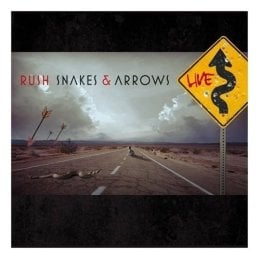| Author |
 Topic Search Topic Search  Topic Options Topic Options
|
Certif1ed 
Special Collaborator


Honorary Collaborator
Joined: April 08 2004
Location: England
Status: Offline
Points: 7559
|
 Posted: July 02 2008 at 03:43 Posted: July 02 2008 at 03:43 |
I'm a litle confused as to why Classic Prog Rock is wholly subsumed by Prog Related - I would have thought that Classic Prog would be out on its own, with other "bubbles" intersecting it.
The description is't very accurate either - the "amalgamation of other genres with rock" process started at least 5-6 years earlier in the Progressive Music Scene, which is what Classic Prog arose from.
There's also a confusion between Progressive Music as a generality and the Progressive Music scene (specific to rock music) I noted above. If it's simply music that breaks convention, then you need to go back another few centuries... 
|
|
The important thing is not to stop questioning.
|
 |
russellk 
Prog Reviewer


Joined: February 28 2005
Location: New Zealand
Status: Offline
Points: 782
|
 Posted: July 02 2008 at 03:09 Posted: July 02 2008 at 03:09 |
I like what Mike's done, and I pretty much agree with him. Great work, Mike. I've been struggling for a few months with a visual representation of the definition of prog. I'm aware of the limitations of Venn diagrams - the boundaries tend to be far too rigid, and there are always exceptions - but it's the INTENT I'm interested in. Could people please try to break this diagram? There should be a place for every band/artist. All comments are appreciated (though I'm not sure about those who think this is a waste of time - I'm not sure why you're reading this thread, in that case!).  Edit: Mike, I'm not trying to usurp your thinking. This is your thread. I'm adding to the debate. If you want me to naff off and make my own thread, I will.
Edited by russellk - July 02 2008 at 03:21
|
 |
Ivan_Melgar_M 
Special Collaborator

Honorary Collaborator
Joined: April 27 2004
Location: Peru
Status: Offline
Points: 19535
|
 Posted: July 02 2008 at 02:07 Posted: July 02 2008 at 02:07 |
 MikeEnRegalia wrote: MikeEnRegalia wrote:
As I see it, there are two major criteria which can be examined to determine whether a piece of music can be called prog:
I believe the main point is that this are two different criterias, one for Prog and another for any genre.
1. is it truly progressive?
Not necesarilly Prog, for example early REM had a very progressive (as an adjective) approach to music compared with the common mainstream, but by no mean it's Prog or should be here.
Anglagard in the 90's made almost exactly what Yes and Genesis did in the 70's, they even refused to use any instrument not availlable in the 70's but they are part of the Progressive Rock Genre beyond any doubt.
2. does it *sound* like some previously recorded music which has already been identified as being "Prog"?
If it has certain elements that we have mentioned "ad nauseam", but still can't completely define it's Ptrog and should be here, if not, well there are lots of clasic Rock sites.
Number one has been defined by Certif1ed, and I largely agree with his definition (and also that statement by Emerson). However, most of what we call prog does not satisfy this definition - and I'm not necessarily talking about new vs. old/classic here. I think we have to acknowledge that there is a certain bandwidth of progressiveness ... some prog artists are less (truly) progressive than others, but we still call them Prog.
It has also been repeated many times that Progressive Rock does not have to be progressive in an evolutionary sense, a band doing what Yes did in 1972 is still Prog even if they didn't evolved a centimeter.
Number two is a much more fuzzy criterium ... nevertheless I think it's necessary. Not only are many bands we call Prog not as innovative or musically challenging as others, there are also some which copy or at least take significant parts of the style of other bands which we know to be Prog.
But still they are Prog, because they play a GENRE called Progressive Rock. A musician who makes a composition which sounds as Bach will probably be writting a Baroque STYLE piece of music, today or in the XXX Century.
By combining these two criteria we essentially get four situations:
For me the combination is not required.
A) Something is truly progressive and also sounds like typical "Prog" music
Ofcourse it's possible and it's the ideal
B) Something is truly progressive, but doesn't sound like typical "Prog" music
Then most surely is progressive but not necessarilly is Progressive Rock.
C) Something is not truly progressive, but sounds like typical "Prog" music
Then it's Progressive Rock by definition.
D) Something is not truly progressive and doesn't sound like typical "Prog" music
Then it's not Prog in 99% of the cases.
Now, the interesting question is: which of these situations are "Prog" to you? Obviously D is clearly not Prog. The absolute purists might go for A only. The musicians among us who don't like derivative music but are inclusive in terms of style might go for A and B. Those who simply compare styles and don't care much for musical intricacies might go for A and C.
In my opinion A and C are almost always Progressive Rock, B can be Prog or not, and D well if it's yellow, has feathers and says quack, it's most surely a duck or in his case they meet all the parameters not to be considered Prog.
If we take into considerations that a general definition of "Prog" should try to incorporate most major views, I can only deduce that both A, B and C qualify. This means that if one of my two criteria is met, a piece of music can be called "Prog".
In general terms I agree that A and C qualify, B is neutral and D most surely is not.
For me the elements of Progressive Rock are much more defining than the fact they could be progressive, evolved or 100 years ahead of their time.
So ... what do you think?  My two cents. My two cents.
IvŠn
|
Edited by Ivan_Melgar_M - July 02 2008 at 02:12
|
|
|
 |
MikeEnRegalia 
Special Collaborator


Honorary Collaborator
Joined: April 22 2005
Location: Sweden
Status: Offline
Points: 20618
|
 Posted: July 01 2008 at 14:42 Posted: July 01 2008 at 14:42 |
|
^ we should be careful to avoid misunderstandings here. I think that for example an album like Mahavishnu Orchestra's Inner Mounting Flame is not prog *by style*. I do think that it's progressive ... thus, by meeting the first criterium, I can call it "prog".
I just doubt that the proverbial "man on the street" back in 1973 would have named that album (or anything by Magma or Van der Graaf Generator) when you had asked him to name some important Prog Rock albums. It's much more likely that it would have been something by Yes or Genesis.
|
|
|
 |
darkshade 
Collaborator


Honorary Collaborator
Joined: November 19 2005
Location: New Jersey
Status: Offline
Points: 10964
|
 Posted: July 01 2008 at 14:32 Posted: July 01 2008 at 14:32 |
|
would you guys classify the band below me as prog? i think i would.
btw to whoever said Fusion is not prog is only partially right. There is Fusion that isnt prog. But prog in itself is Fusion. There's also a difference between Jazz-Fusion and Jazz-Prog-Fusion. Sometimes they overlap, sometimes with straight jazz. Jazz-fusion is too big a world...
|
|
|
 |
MikeEnRegalia 
Special Collaborator


Honorary Collaborator
Joined: April 22 2005
Location: Sweden
Status: Offline
Points: 20618
|
 Posted: July 01 2008 at 13:35 Posted: July 01 2008 at 13:35 |
 omri wrote: omri wrote:
I think it's a nice way of classifying.
Personally I will include A B & C as prog.
However I think a true purist will choose only B . A real progressive artist is someone who did something totally new = something never been heared before. I'll use the example of Magma given earlier - this is a tottaly new thing and I think they are one of the most progressive bands ever.
|
Well, the classic bands/albums are a unique case - They also are A, since they define the reference for comparison. In essence, they're pretty similar in style to themselves ...  About Magma: I think that technically they are not part of the prog "nucleus". Undoubtedly many people who favor the Avant-Garde bands will disagree ... but in all fairness, I doubt that as far as popularity, number of fans etc. were concerned bands like Yes and Genesis were much more responsible for the formation of "Prog" as a genre/style than other bands like VdGG, Gentle Giant or Magma. I'm a big fan of those bands, but I think they are a prime example for bands which aren't that closely related to the purest forms of prog in terms of style (60%), but of course are very (truly) progressive (80-100%). As far as innovation is concerned ... Magma are pretty unique, but if you listen to an early album (e.g. 1,001 Degrees Centigrade) and then to for example Frank Zappa - Hot Rats, there are obvious connections/influences. I'm very sure that most of the time we think that something's unique and innovative, it's because we simply don't (yet) know all the influential albums.
|
|
|
 |
Single Coil 
Forum Senior Member


Joined: June 29 2005
Status: Offline
Points: 301
|
 Posted: July 01 2008 at 13:28 Posted: July 01 2008 at 13:28 |
 rushfan4 wrote: rushfan4 wrote:
...AOR could be said to have been derived from classic symphonic prog rock
|
That's pretty profound ! Since listening to AOR stations is how I discovered Rush, Yes and Kansas. At that early stage of my prog listening, I had no idea just how "different" those bands were from the bulk of the radio station's playlist.
I agree that plenty of "prog" albums had content that easily fit into an AOR playlist. And you're right, maybe that's just because AOR itself featured bands that "fit the mold".
Certainly, many people during AOR's heyday did not see Supertramp and Tull as "prog" bands. But that may be because they didn't really seem all that different from Boston, Toto, Styx and Traffic.
Edited by Single Coil - July 01 2008 at 13:29
|
|
If it's worth playing, it's worth playing loud!
|
 |
omri 
Forum Senior Member

Joined: April 21 2005
Location: Israel
Status: Offline
Points: 1250
|
 Posted: July 01 2008 at 13:21 Posted: July 01 2008 at 13:21 |
I think it's a nice way of classifying.
Personally I will include A B & C as prog.
However I think a true purist will choose only B . A real progressive artist is someone who did something totally new = something never been heared before. I'll use the example of Magma given earlier - this is a tottaly new thing and I think they are one of the most progressive bands ever.
To Ivan : Personally I find both Boston and Toto quite mediocre and boring. On the other hand, Bowie is a different case IMO. He was there at the time prog just started and have done things quite innovative. As an example I advise to hear "Cygent comitee" from Space odity. This 10 minutes track is a real epic, great lyrics, very emotional and quite melodic. I think you would like this one and I feel it is quite progy.
|
|
omri
|
 |
rushfan4 
Special Collaborator


Honorary Collaborator
Joined: May 22 2007
Location: Michigan, U.S.
Status: Offline
Points: 66016
|
 Posted: July 01 2008 at 12:38 Posted: July 01 2008 at 12:38 |
I am in agreement with your 4 criteria Mike. But as you said, it is not necessarily a black/white decision. Not to take the thread off-topic, since the Boston/Toto, etc... debates have raged on in other threads, but what I have said when suggesting inclusion of a band such as Boston or Toto could in a way fall within your definitions; hence the not black/white decision. It was either said above or in a different thread, but AOR could be said to have been derived from classic symphonic prog rock. To my ear, a band like Boston or Toto sounds far more like Yes, Rush, Kansas or Genesis, then a band like Sleepytime Gorilla Museum or Meshuggah. So yes, to my ear Boston or Toto sound more like a progressive rock band then SGM or Meshuggah. For me, the difficult part to grasp is that these bands that sound almost absolutely nothing like typical prog bands, are considered to be prog bands and of course the reason for that is your first criteria, that they are "progressing" music, whatever that means.
I suppose that on a different scale there is a similarity to the history of mankind. Comparing ape to man doesn't necessarily make sense until the missing links are found to make the connection. The same would go to comparing SGM or Meshuggah to King Crimson or Genesis. The missing links would have to be filled in to make the connection.
In summary, I agree with your definitions and I agree that it is not all black and white. And since this is a good thread, I hope not to distract from it by continuing a Boston/Toto debate since those have already been done. Like Ivan, I'd much prefer to explore and discuss bands that need the discussing and exploring. Or at least read about others discussing them, since most likely I know little or nothing about them.
Edited by rushfan4 - July 01 2008 at 12:40
|
|
|
 |
MikeEnRegalia 
Special Collaborator


Honorary Collaborator
Joined: April 22 2005
Location: Sweden
Status: Offline
Points: 20618
|
 Posted: July 01 2008 at 12:17 Posted: July 01 2008 at 12:17 |
 sleeper wrote: sleeper wrote:
As for comparing Hinterland and Moonmadness, I'd say Wobbler, but thats just me.
|
Which means that I choose a good example for my point ... I'm also inclined to choose Wobbler, but I'm sure that many people would disagree.
|
|
|
 |
MikeEnRegalia 
Special Collaborator


Honorary Collaborator
Joined: April 22 2005
Location: Sweden
Status: Offline
Points: 20618
|
 Posted: July 01 2008 at 12:15 Posted: July 01 2008 at 12:15 |
 Ivan_Melgar_M wrote: Ivan_Melgar_M wrote:
But what's the point Mike?
The point - from a practical angle - is that by dividing "prog" into two criteria we can provide more insight into why a particular album is listed as prog. It can be either because it's truly progressive or because it's similar to key prog albums in terms of style.
People will still be forgetting of really Prog bands with the excuse...We don''t know them or They are noit availlable or We don't like cirtual music or I can't fin them in my local store-
And as always will keep making case after case for the ibnclusion of Boston, Toto, etc, because they are availlable everywhere or simply because they enjoy their music.
I don't really see how this relates to the topic ... neither Boston nor Toto would be prog according to my definition.
I read in this forum:
1.- Genres as Rio or Avant are too noisy for most
2.- Symphonic and Neo are Retro Prog
This might actually be true for most modern bands. "Symphonic" and "Neo" are styles, and if modern bands stay within the margins of those styles without adding new elements they can be called "Retro". "Retro" is - in a way - another word for my second criterium. The more a band moves away from an established style, the greater is the chance that the music is truly progressive, and the less likely it is that the music will be accepted as "prog" by the second criterium - and many prog purists should value this criterium highly.
3.- Space as Pinjk Floyd "Are not really Prog" according to many
In a way it isn't. Pink Floyd - Dark Side of the Moon is an album which for me doesn't score too high on the second criterium. It does however satisfy criterium one - although it takes a bit of experience and musical/historical knowledge to identify how it is actually progressive - and to some listeners it might even seem boring and repetitive.
4.- Fusion is Jazz not Prog
Also true ... Jazz-Fusion doesn't score high on the second criterium. Some of it also doesn't score high on #1, but artists like Mahavishnu or Return to Forever certainly qualify.
5.- Prog Metal is not Prog.
It's a different genre. In the context of your sentence "Prog" means "Prog Rock". There are different key bands for different genres ... incidentally: If you have the chance, listen to Fates Warning - Perfect Symmetry, a honest recommendation from me!
6.- BNew Prog is derivative
Like I said above: Often it is either derivative/retro, or truly progressive and too remote in terms of style for most people to call it prog.
7.- Old Prog is outdated
Now I haven't read that anywhere ... I'd be interested to see the actual post before I believe it.
9.- 80's Prog is weak
I'd say that 80s *sound* is weak ... it's the decade where synthetic sounds became widely - and cheaply - available and many bands simply went too far. It's only my opinion of course, but in this opinions most of the worst produced albums are from the 80s.
But Bowie, Toto and Boston are OK.
They are great artists ... but not prog. Only few people say otherwise!
I simply can't understand.
IvŠn |
|
|
|
 |
sleeper 
Prog Reviewer


Joined: October 09 2005
Location: Entropia
Status: Offline
Points: 16449
|
 Posted: July 01 2008 at 12:10 Posted: July 01 2008 at 12:10 |
 MikeEnRegalia wrote: MikeEnRegalia wrote:
 sleeper wrote: sleeper wrote:
In general I agree with what you've said Mike and look at things in a
similar way, but I think Whistler said it best in his blog; "Prog isnít a sound; itís a way of doing things. Or rather, itís an ideal.". For me, those two sentencies sum up progressive music and can be applied to just about everything we consider progressive here in the archives. This is where I differ with Certif1ed, he's looking for a specific musical charecteristic that is shared by all prog bands, at least the early ones that created prog, and what he's found is something that only people with a good ear and a strong grounding in music theory can hear (useless to most of us, then).
|
Nice post!
This statement you quoted ("Prog isn't a sound - it's a way of doing things") is true, but what about bands like Wobbler ... or The Flower Kings? Surely the music is prog. Now you may say "Wait a minute ... it only sounds like prog!". But what difference does it make to new listeners? If you play them the Wobbler album and Camel - Moonmadness and ask them which is "more proggy", I'm not sure what they would say.
My point is that while it is very interesting to point out which recordings are "truly progressive" and which are merely copies/adaptations of those original pieces of music, both can be called "prog" ... the label includes both extremes. This is the very reason why prog is so hard to define, and why any "wholistic" attempt to define it is bound to fail.
|
Its why I like that statement, it can be applied in two ways, to mean that the band in question is trying to emulate the classics by doing things in a similar way, or its tacking the same mentality/approach as the classic bands but creating very different music. Completely agree with that second paragraphe. As for comparing Hinterland and Moonmadness, I'd say Wobbler, but thats just me. 
|
Spending more than I should on Prog since 2005 
|
 |
MikeEnRegalia 
Special Collaborator


Honorary Collaborator
Joined: April 22 2005
Location: Sweden
Status: Offline
Points: 20618
|
 Posted: July 01 2008 at 12:02 Posted: July 01 2008 at 12:02 |
 sleeper wrote: sleeper wrote:
In general I agree with what you've said Mike and look at things in a
similar way, but I think Whistler said it best in his blog; "Prog isnít a sound; itís a way of doing things. Or rather, itís an ideal.". For me, those two sentencies sum up progressive music and can be applied to just about everything we consider progressive here in the archives. This is where I differ with Certif1ed, he's looking for a specific musical charecteristic that is shared by all prog bands, at least the early ones that created prog, and what he's found is something that only people with a good ear and a strong grounding in music theory can hear (useless to most of us, then).
|
Nice post!  This statement you quoted ("Prog isn't a sound - it's a way of doing things") is true, but what about bands like Wobbler ... or The Flower Kings? Surely the music is prog. Now you may say "Wait a minute ... it only sounds like prog!". But what difference does it make to new listeners? If you play them the Wobbler album and Camel - Moonmadness and ask them which is "more proggy", I'm not sure what they would say. My point is that while it is very interesting to point out which recordings are "truly progressive" and which are merely copies/adaptations of those original pieces of music, both can be called "prog" ... the label includes both extremes. This is the very reason why prog is so hard to define, and why any "wholistic" attempt to define it is bound to fail.
|
|
|
 |
Ivan_Melgar_M 
Special Collaborator

Honorary Collaborator
Joined: April 27 2004
Location: Peru
Status: Offline
Points: 19535
|
 Posted: July 01 2008 at 11:35 Posted: July 01 2008 at 11:35 |
But what's the point Mike?
People will still be forgetting of really Prog bands with the excuse...We don''t know them or They are noit availlable or We don't like cirtual music or I can't fin them in my local store-
And as always will keep making case after case for the ibnclusion of Boston, Toto, etc, because they are availlable everywhere or simply because they enjoy their music.
I read in this forum:
1.- Genres as Rio or Avant are too noisy for most
2.- Symphonic and Neo are Retro Prog
3.- Space as Pinjk Floyd "Are not really Prog" according to many
4.- Fusion is Jazz not Prog
5.- Prog Metal is not Prog.
6.- BNew Prog is derivative
7.- Old Prog is outdated
9.- 80's Prog is weak
But Bowie, Toto and Boston are OK.
I simply can't understand.
IvŠn
|
|
|
 |
sleeper 
Prog Reviewer


Joined: October 09 2005
Location: Entropia
Status: Offline
Points: 16449
|
 Posted: July 01 2008 at 11:12 Posted: July 01 2008 at 11:12 |
|
In general I agree with what you've said Mike and look at things in a
similar way, but I think Whistler said it best in his blog; "Prog isnít a sound; itís a way of doing things. Or rather, itís an ideal.". For me, those two sentencies sum up progressive music and can be applied to just about everything we consider progressive here in the archives. This is where I differ with Certif1ed, he's looking for a specific musical charecteristic that is shared by all prog bands, at least the early ones that created prog, and what he's found is something that only people with a good ear and a strong grounding in music theory can hear (useless to most of us, then).
|
Spending more than I should on Prog since 2005 
|
 |
MikeEnRegalia 
Special Collaborator


Honorary Collaborator
Joined: April 22 2005
Location: Sweden
Status: Offline
Points: 20618
|
 Posted: July 01 2008 at 10:44 Posted: July 01 2008 at 10:44 |
|
^ interesting idea - to list sub genres - but actually I would even try to be more precise and move to the album level.
|
|
|
 |
Single Coil 
Forum Senior Member


Joined: June 29 2005
Status: Offline
Points: 301
|
 Posted: July 01 2008 at 10:26 Posted: July 01 2008 at 10:26 |
 MikeEnRegalia wrote: MikeEnRegalia wrote:
 Single Coil wrote: Single Coil wrote:
I like your way of thinking. I think it might help me if I had some examples.
Let me try.....
A) Something is truly progressive and also sounds like typical "Prog" music
Yes, Genesis
B) Something is truly progressive, but doesn't sound like typical "Prog" music
Devin Townsend, Magma, Discipline by King Crimson
C) Something is not truly progressive, but sounds like typical "Prog" music
Tiles, Enchant, Jadis, Magenta
D) Something is not truly progressive and doesn't sound like typical "Prog" music
Iron Maiden, David Bowie
I am intentionally leaving Dream Theater and Opeth off the list. Also, I am not sure where to put Rush. |
I basically agree with these examples. I think that it's best to not make "binary" decisions about these criteria ... some albums are very difficult to pinpoint in terms of those two criteria. For example, Iron Maiden might be slightly progressive and also slightly related in style to typical Prog (e.g. the elaborate bass lines).
(See also next answer to GoldenSpiral's post)
|
You're right, I guess you can't just make "binary" decisions.
I was thinking that maybe I should have listed Sub-Genres, instead of Band or Albums....but that still would have been impossible.
Edited by Single Coil - July 01 2008 at 10:27
|
|
If it's worth playing, it's worth playing loud!
|
 |
MikeEnRegalia 
Special Collaborator


Honorary Collaborator
Joined: April 22 2005
Location: Sweden
Status: Offline
Points: 20618
|
 Posted: July 01 2008 at 10:08 Posted: July 01 2008 at 10:08 |
 GoldenSpiral wrote: GoldenSpiral wrote:
The main problem I see in this list is that it now requires a definition of "Typical 'Prog' Music"
I edited the original post ... thanks for the heads up!
I tend to like things in the B category, though we have things from all 4 here.
I don't really know what to make of it all. I know you're a fan of quantifying things as much as possible, Mike, and I don't want to belittle your efforts. However, I think "progressive" is a feeling and/or attitude and can only really be represented by a nebulous cloud, not a solid Venn diagram. |
I actually don't want to quantify everything ... of course I'll implement the two criteria on my website (in fact I already did  ), but they should be relatively fuzzy. These are the steps I use: 0%: Not 20%: Slightly 40%: Moderately 60%: Quite 80%: Very 100%: Extremely I don't really think that's too specific. It also relates well to normal human language ... for example, someone could say "Spock's Beard are only moderately progressive, but their music sounds a lot like classic prog". You could argue about what "a lot" means, but I'd translate this into 40% progressive, 60% prog by style. Of course people tend to think about quantizing as soon as percentages are used ... I'll probably have to find a way to avoid showing them directly. 
Edited by MikeEnRegalia - July 01 2008 at 10:09
|
|
|
 |
MikeEnRegalia 
Special Collaborator


Honorary Collaborator
Joined: April 22 2005
Location: Sweden
Status: Offline
Points: 20618
|
 Posted: July 01 2008 at 10:00 Posted: July 01 2008 at 10:00 |
 Single Coil wrote: Single Coil wrote:
I like your way of thinking. I think it might help me if I had some examples.
Let me try.....
A) Something is truly progressive and also sounds like typical "Prog" music
Yes, Genesis
B) Something is truly progressive, but doesn't sound like typical "Prog" music
Devin Townsend, Magma, Discipline by King Crimson
C) Something is not truly progressive, but sounds like typical "Prog" music
Tiles, Enchant, Jadis, Magenta
D) Something is not truly progressive and doesn't sound like typical "Prog" music
Iron Maiden, David Bowie
I am intentionally leaving Dream Theater and Opeth off the list. Also, I am not sure where to put Rush. |
I basically agree with these examples. I think that it's best to not make "binary" decisions about these criteria ... some albums are very difficult to pinpoint in terms of those two criteria. For example, Iron Maiden might be slightly progressive and also slightly related in style to typical Prog (e.g. the elaborate bass lines). (See also next answer to GoldenSpiral's post)
|
|
|
 |
MikeEnRegalia 
Special Collaborator


Honorary Collaborator
Joined: April 22 2005
Location: Sweden
Status: Offline
Points: 20618
|
 Posted: July 01 2008 at 09:54 Posted: July 01 2008 at 09:54 |
 ExittheLemming wrote: ExittheLemming wrote:
very interesting and well researched idea BUT
A - If something 'sounded' like typical prog music, could it be deemed truly 'progressive' ? (Do you mean it may be similar to some earlier prog ? or do you mean it shares broadly agreed prog characteristics but ventures out into new territory ?)
i.e otherwise wouldn't it be tantamount to 'retro' bands in C ?
Despite my infernal nitpicking, I think you may be on to a really good idea here
|
Yes - C in fact stands for retro/regressive bands ... or the typical expression "... clone". My point is that regardless of whether these bands are truly progressive or not, their music should still be called "Prog".
|
|
|
 |
/PAlogo_v2.gif)


